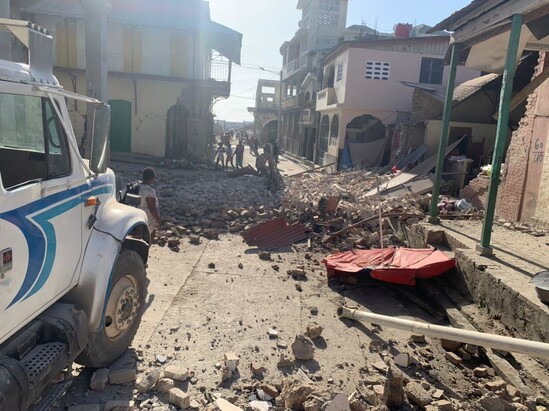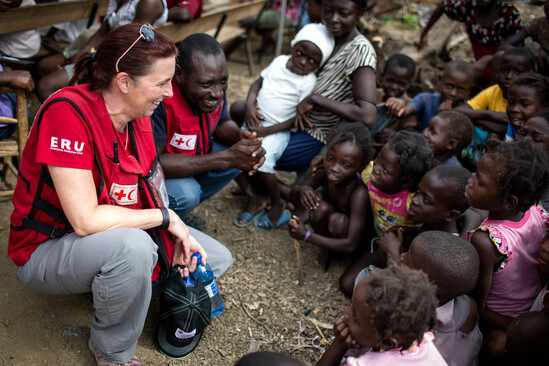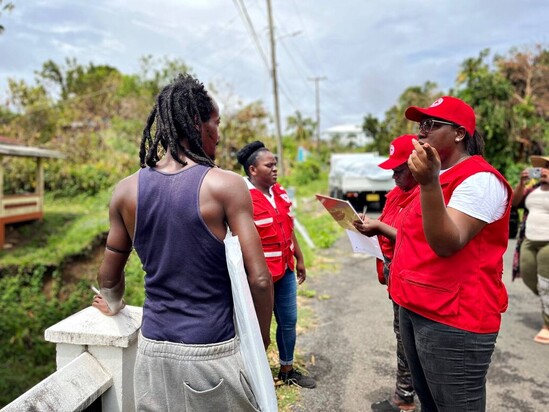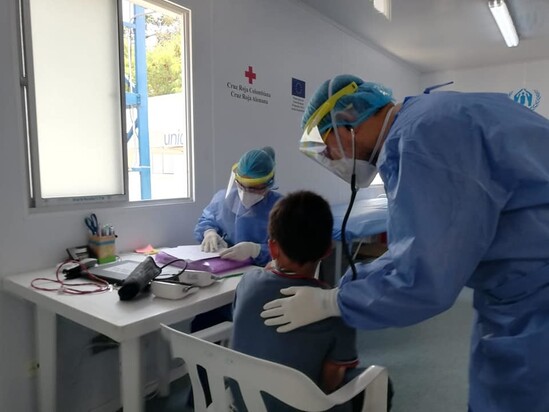Americas
- Humanitarian aid in Latin America and the Caribbean
- How the Canadian Red Cross supports local Red Cross Societies
Donate to the International Programs Fund
Humanitarian aid in Latin America and the Caribbean

(Photo credit: IFRC)
The Canadian Red Cross has supported our neighbours in the Americas region since 1976, nurturing a legacy of continental friendship and solidarity within Latin America and the Caribbean.
Humanitarian aid in Latin America and the Caribbean is vital. These regions are the second most disaster-prone in the world, with the situation worsened by severe income inequality, violence, and the largest migration crisis globally. With escalating climate changes, it’s predicted that heightened poverty and inequality will intensify the region's vulnerability to these risks.
Addressing the challenges faced by Latin America and the Caribbean requires increasingly vital engagement with the Red Cross. We strengthen our bonds with other National Societies in the Red Cross Movement in the region by providing shared expertise and resources. We remain devoted to gender-responsive humanitarian services rooted in the disaster risk management cycle, fostering resilience, and delivering timely local response to communities challenged by complex regional crises.
How the Canadian Red Cross supports local Red Cross Societies
Haiti

(Photo credit: Marko Kokic / Canadian Red Cross)
The Canadian Red Cross has been working in Haiti for over 30 years. Following the 2010 earthquake, we partnered with the Haitian Red Cross to provide critical assistance to communities and support their emergency response capacity through several projects focusing on safe shelter, health, and violence prevention.
Honduras

(Photo credit: Luc Alary / Canadian Red Cross)
The Canadian Red Cross began its work in the region in 2000, following Hurricane Mitch in partnership with the Honduran Red Cross. Honduras is in a region that experiences both conflict and extreme shifts in climate. The Honduran Red Cross has specialized teams in disaster response emergencies and works closely with schools, government and other institutions to help meet emergency needs in the most remote areas of Honduras.
Caribbean

(Photo credit: Susana Arroyo / Grenada Red Cross / IFRC)
The Caribbean is vulnerable to many kinds of natural disasters like hurricanes, storms, flooding, volcanic eruptions, and earthquakes. The effects of climate change have made these events even more extreme, creating a considerable need for external aid.
Over the years, the Canadian Red Cross and the Government of Canada have committed significant resources to strengthen disaster resilience in the Caribbean. Caribbean countries can often be overwhelmed by large-scale emergencies, especially when volunteers themselves are directly affected by the crises they are helping to manage. Because of these factors, it is crucial for local National Red Cross Societies to have robust response systems in place.
Key initiatives that highlight these investments to help strengthen local Red Cross Societies in the Caribbean include the Capacity Building and Emergency Response in the Americas and Community Resilience Building Caribbean Region projects. With financial and strategic support from the Government of Canada, these projects aimed to enhance the disaster response capacities of local Red Cross teams across the Caribbean. This work has also helped to build resilience and improve regional cooperation and collaboration. The work of the Canadian Red Cross in the Caribbean has contributed to developing sustainable local solutions and strengthening local ability to respond to crises.
Colombia

(Photo credit: Colombian Red Cross)
Colombia is known for its remarkable biodiversity and natural beauty, but it also hosts the longest longest-running internal conflict in the Americas region. More recently, Colombia has become a destination for the second largest population of displaced people globally, including two million Venezuelan migrants.
While refugees in Colombia have access to a universal health system accessible to migrants, there are several barriers to accessing this coverage. The healthcare system is under severe strain to meet these demands, in addition to a shortage in medications and supplies.
Colombia is also vulnerable to natural disasters like floods and landslides, which further amplifies the issues vulnerable communities are facing. Large numbers of internally displaced people, refugees, and marginalized populations, face limited access to basic services such as healthcare, housing, and education. There is an immense need for humanitarian assistance.
The Colombian Red Cross Society is the country’s leading humanitarian organization. Their dedicated staff and 30,000 volunteers deliver healthcare, mental health support, disaster risk and emergency management, and protection initiatives were needs exist across Colombia. They also play an important role in the national disaster risk management system and work closely with all government entities and international partners.
Over the years of the Canadian Red Cross’s cooperation with Colombia, with support from the Government of Canada, we have provided financial and technical resources, as well as supplies, in response to multiple crises in Colombia.
